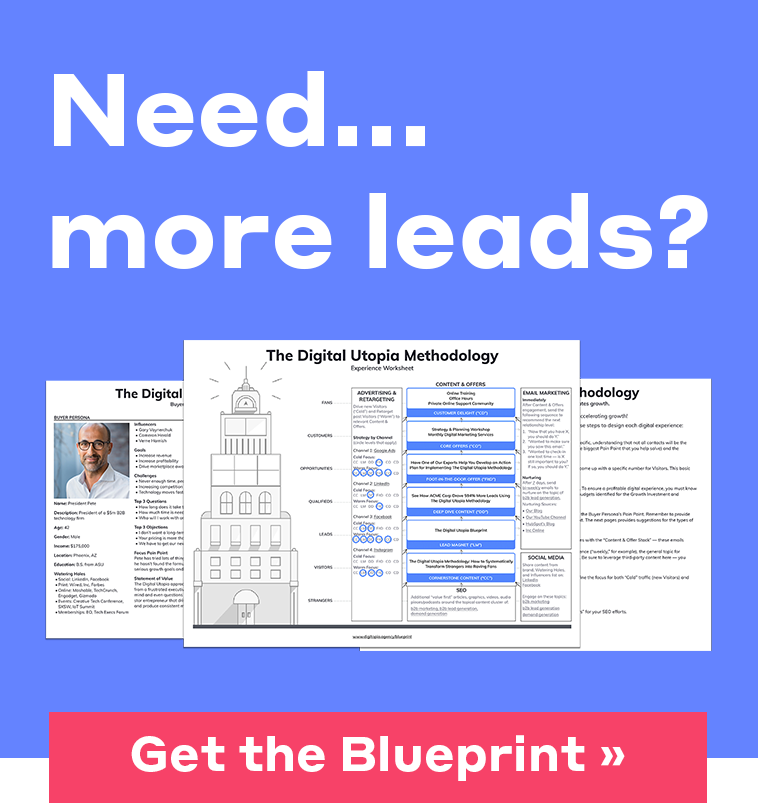Listen to the episode
About the podcast
The Digital Utopia Podcast is for SMB Marketers and Business Leaders looking to align their Marketing, Sales, and Service departments so they’re part of one powerhouse growth team.
Each episode will dive into the strategies, philosophies, and tools that will change your approach to organizational growth, give you renewed focus and clarity, and allow you to build a brand that not only helps you stand out—but win.
The Digital Utopia Podcast is produced by Digitopia and hosted by Frank Cowell and Joseph Freeman.
Episode transcription
Frank Cowell: [00:00:00] Hey gang! Welcome to The Digital Utopia Podcast, episode 30. I'm your host Frank Cowell. And I'm joined by my cohost
Joseph Freeman: [00:00:11] Joseph Freeman.
Frank Cowell: [00:00:12] This today is a quick hit episode and it is a summary, a teaser into episode 31, and that is answering the question. What technology is needed to empower RevOps.
Joseph Freeman: [00:00:26] That's a good one,
Frank Cowell: [00:00:27] Joe, quick hit, five minutes or less. We're going to give the teaser into what we discussed at length in the very next episode. So if you're short on time, just listen to this one episode, we have five categories of tech you need to enable/empower RevOps. What are those five categories, Joe?
Joseph Freeman: [00:00:44] Okay. So working backward through the life cycle stages fan all the way back down to the visitor, they started as we need a service software.
Okay. And we'll talk about what that, isn't just second here. We need a sales software. We need a marketing software. We need some middleware, which is what connects them all together. And then we need an analytics layer, some sort of dashboarding software.
Frank Cowell: [00:01:06] To be able to write, to be able to report across that entire life cycle.
Joseph Freeman: [00:01:10] That's right. Because each of those individual softwares often come with reports and metrics specific to its function. But there's nothing that is displaying that across all life cycle stages for an executive to look at and say, "ah", there's the bottleneck.
Frank Cowell: [00:01:24] RIght? Because you want to know the business story, not the clicks and the ticks.
Right. That's right.
Joseph Freeman: [00:01:27] Okay. So when we talk about service software, we're really talking about stuff like Zendesk, we're talking about, of course, HubSpot has some of it. And w what is included in that is. A ticketing system, it would be a knowledge base. It would be maybe a live chat for your website to be all of the things that you need your service team to have access to, to really service the clients well above and beyond the actual delivery of the product.
Frank Cowell: [00:01:55] Okay. Okay. Now sales.
Joseph Freeman: [00:01:57] Sales. So sales, we need, of course, to be able to track deal pipelines, maybe some automated sales sequences, somebody gets into the top of the sequence and they get 15 emails sent to them. We need to be able to track that we need to have a sales manager who can keep his sales team accountable, his or her sales team accountable, that would be sales software, like what, Salesforce does that you've got stuff like Zoho CRM. This is basically a CRM.
Frank Cowell: [00:02:23] HubSpot's in there again.
Joseph Freeman: [00:02:24] HubSpot of course. Then we've got
Frank Cowell: [00:02:27] marketing, marketing.
Joseph Freeman: [00:02:28] So marketing, this is where you're sending out all of your marketing emails, your marketing automation. This is probably where you're doing your lead scoring and your segmentation of your list got a whole bunch of options here.
Right? You've got everything from the most basic to the most complicated stuff like MailChimp. You've got stuff like Pardot, Marketo, and of course you've got HubSpot. Then we move on to the middleware.
What is middleware Frank?
Frank Cowell: [00:02:52] So we'll, middlewares important because it'll tie disparate systems together.
So if you don't have a single system for all three of those. Primary hubs that you just described, you're going to need to tie them together to ensure that life cycle tracking is there. And data's re you know, you're closing the loop with the data. And so that middleware is a service that will tap into the APIs of those disparate systems and get that data St.
Right. So it passes the data back and forth between them is
what you're saying. Correct. That's necessary if you don't have those systems naturally integrated. If their integrations aren't built in to be able to do that through point and click, or if you don't have a programmer on staff who can code that out, you're going to need middleware to get those sinked up.
Joseph Freeman: [00:03:33] Yeah. So that would be stuff like if this, then that that's a software, Zapier is one of them. You mentioned you can have it custom programmed. You definitely can do that. It's more expensive. But sometimes you need to do that, to get exactly what you need from the software you're using. Especially if you're not using really common software, if you're using something more industry-specific.
Okay. Fifth one that you need in terms of technology is a dashboarding tool, some sort of layer to see everything across all softwares, what is this?
Frank Cowell: [00:04:01] Yeah, because like you mentioned, each of those systems, they have their own analytics and reporting, but if what's important, when it comes to rev, ops is not telling the story of the clicks and ticks the individual teams need those things.
What's important is that you are, you're able to tell the business story so you can look at the macro funnel of the business. That's what the executive team wants to see. So this is the analytics category, and you're going to satisfy that with some sort of dashboarding software. Again, if you're using an all in one system.
Then that's fine. It's going to have that built into, because it's going to be able to talk across all those layers, but most companies don't have an all in one system. So you're going to need something like a, a Klipfolio or like a Zoho analytics, which I'm a huge nerd for. I've been playing around a lot, right.
That over the past year, but you need some sort of way to bring all that data together into one data repository. And then, a mathematical set of functionality to run all the math that you need to run. And then some sort of display presentation. That's what these dashboarding software is do again, like a Tableau or a Klipfolio, or Zoho analytics.
Yeah.
Joseph Freeman: [00:05:09] So you need these five different categories. You need to marry them all together, and that will allow you to properly start running your RevOps processes. You know, we're big fans of HubSpot.
Frank Cowell: [00:05:19] Yeah. And it does all those things in one. That's why, when I was talking about it. Yeah. It's not that because it's a commercial for it and yes, we are an affiliated partner, but we love it because it's all in one.
And I would suggest that you're not doing RevOps. If you don't have an answer for those five categories, again, it doesn't have to be HubSpot, but you have to get those five categories. Yeah. Cool. Hope you enjoyed this quick hit. If you want to hear the full conversation of what we talked about. Tune in to the next episode, we talk about each of these five categories in greater detail.



